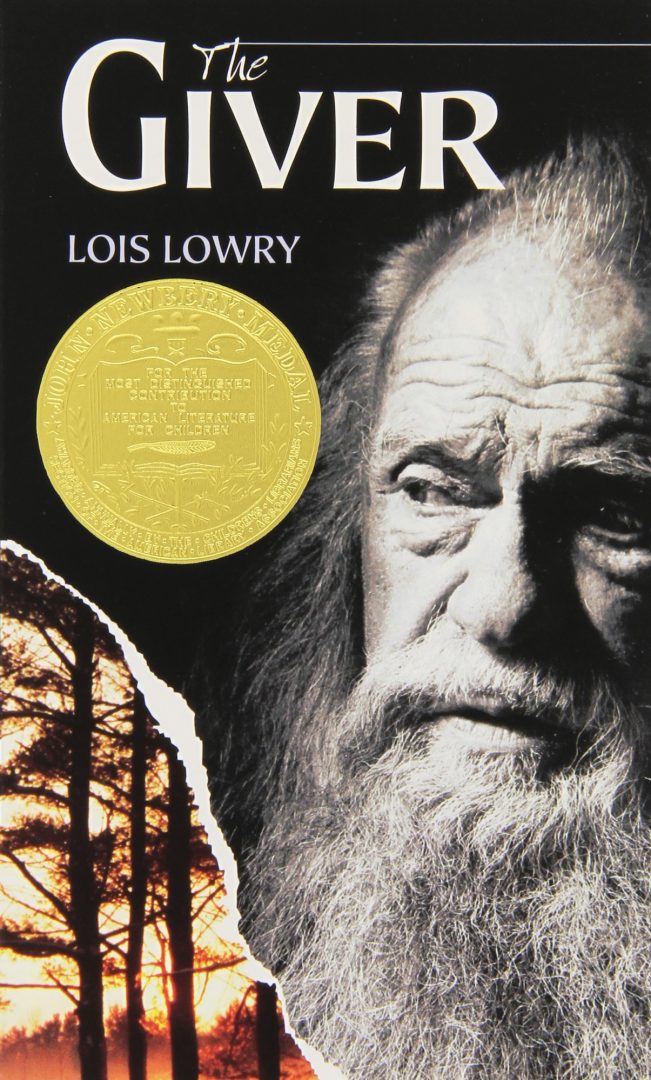Table of Contents
A Society Without Pain—or Freedom
Lois Lowry’s The Giver is a deceptively simple novel that unfolds like a psychological experiment. Wrapped in the plain language of a young adult narrative is a dystopian blueprint—clinical, calm, and quietly terrifying. In a world where color, emotion, choice, and pain have all been engineered out of existence, Lowry asks the unthinkable: what is the cost of eradicating suffering?
The story follows Jonas, a 12-year-old boy chosen to inherit the role of Receiver of Memory, a rare position in a community that prides itself on Sameness. What follows is a slow, cerebral, and ultimately profound descent into truth—not just about the past, but about what it means to be alive.
The Community: Where Control is a Virtue
The world of The Giver is chilling in its quietness. There is no war, no poverty, no fear—but neither is there color, music, love, or joy. Choice has been eliminated in favor of structure. Jobs are assigned, families are assembled by committee, and feelings are regulated by daily rituals of language and medication.
To an outsider, the Community appears utopian. But Lowry reveals its darkness not through violence, but through absence. The horror is not in what people experience, but in what they cannot. Here, ignorance is not a flaw—it is a feature. The past has been erased, and with it, the raw experience of being human.
Jonas and the Burden of Memory
Jonas is chosen to be the next Receiver of Memory, a solitary and sacred role. His job is to bear the memories of a world before Sameness—a world filled with color, sensation, suffering, and beauty. These memories are transmitted by The Giver, an old man burdened with the pain of history.
Through Jonas’s initiation, the reader experiences a kaleidoscope of emotion: the thrill of sledding, the agony of war, the joy of love. These moments, though brief, are vivid and searing. They break Jonas open—and with him, the reader.
The burden of memory is not just informational. It is moral. In gaining knowledge of what was lost, Jonas becomes unable to return to ignorance. He begins to see the hollowness of his world and the cruelty that masquerades as peace.
Emotion, Choice, and the Illusion of Safety
The novel’s philosophical tension lies between safety and freedom. The Community has sacrificed one for the other. In the name of avoiding pain, it has relinquished the capacity for depth, for growth, and for love. Real emotion is considered dangerous—hence the daily pills taken by citizens to suppress desire.
Lowry paints a society where euthanasia is euphemistically termed “release,” where infants and the elderly are quietly disposed of if they don’t conform. What’s chilling is the serenity with which these actions are carried out. There is no malice—only procedure.
Jonas’s discovery of what “release” actually means marks his irreversible awakening. In that moment, the novel shifts from a philosophical allegory to a moral call-to-action. To feel is to risk—but to not feel is to die in spirit.
The Symbolism of Color and Music
One of Lowry’s most elegant devices is Jonas’s awakening to color. The Community sees in grayscale—color has been biologically edited out of existence. Jonas’s ability to see red is his first sign of transformation. Color becomes a metaphor for emotional and moral complexity, for seeing beyond the prescribed narrative.
Likewise, music—though only hinted at—symbolizes what cannot be structured. When Jonas asks The Giver if he can hear music, and the old man replies, “No. I gave that up when I became the Receiver,” we glimpse the soul of the novel. Sacrifice is real. Memory, beauty, and joy are costly.
And yet, in giving them to Jonas, The Giver affirms that such a cost is worth bearing.
Allegory and Archetype
At its core, The Giver is an archetypal story: the journey from ignorance to knowledge, from child to adult, from safety to sacrifice. Jonas is not just a boy—he is Everyman, waking up inside a machine built to keep him asleep.
The Giver, meanwhile, is a Christ-like figure: the bearer of suffering for the sake of the many. His solitude, his knowledge, and his willingness to pass it on at great cost all point to the redemptive possibility of memory.
In this way, The Giver transcends its genre. It is not just young adult fiction—it is modern mythology, coded for moral revival in a technocratic age.
Style and Precision
Lowry’s prose is spare, almost antiseptic—a perfect reflection of the world she describes. Her control of tone mirrors the Community’s own repression, making the novel’s emotional climaxes hit even harder. When Jonas experiences real pain or joy, the contrast is visceral.
The language is accessible, but not simplistic. Like Orwell’s 1984 or Huxley’s Brave New World, The Giver gains power from restraint. It speaks softly—and leaves a permanent mark.
TL;DR
The Giver is a masterpiece of minimalist dystopia. It speaks directly to our cultural moment: a time when comfort often overrides courage, and convenience masks control. In Jonas’s rebellion, we find the quiet genesis of freedom—not the loud kind that topples governments, but the inner kind that dares to feel.
Lowry reminds us that memory is not just a personal archive—it is a moral inheritance. Without it, we lose our bearings. With it, we carry the weight of our past—but also the possibility of a future that is not merely safe, but meaningful.
Key Takeaways
- Memory is both a burden and a blessing; it’s the root of empathy and moral growth.
- Sameness eliminates suffering—but also love, beauty, and freedom.
- Jonas’s transformation mirrors the classic hero’s journey: awakening, rebellion, and sacrifice.
- Lowry’s prose is clean yet layered, allowing deep themes to resonate beneath simplicity.
- The novel endures as a warning: in our quest to perfect life, we may erase what makes it worth living.

Leave a Reply